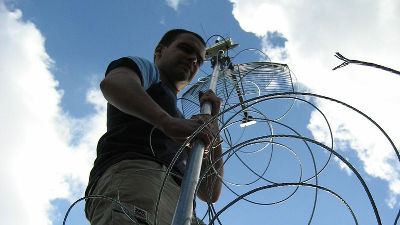How do submarines communicate under the sea?

Submarines that carry out operations under the sea often do not surface for hours, days, or months once dive. Hackaday, a technology news blog, explains how submarines communicated with other ships and the ground when all sides were in the sea, and the history of undersea communications.
The Many Methods Of Communicating With Submarines | Hackaday
In World War I, when submarines began to take off on the battlefield, once a submarine dived into the sea, it would be unable to communicate with base stations or other ships unless it subsurfaced again. was. However, since submarines at that time were basically operating as surface ships, and only dive when attacking or when avoiding tracking, there was no particular problem even if communication became impossible during diving. That's right.

The U.S. Navy, which was performing a similar operation to Germany, introduced a communication device called 'AN/BQC-1A', also known as 'Gertrude', to enable submarines to communicate underwater.

Gertrude is a battery-powered
After the end of World War II, when nuclear submarines that can perform diving activities for several months appeared, the role of submarines changed from 'units that attack enemy transport ships while working together' to 'units that can launch nuclear missiles from the sea' .. As a result, stealth of submarines has become more important than ever.
However, sending a signal from a submarine to the ground displaces one's whereabouts, and it is difficult to equip the submarine with equipment that can transmit a large amount of data. For this reason, communication systems for submarines during the Cold War were required to 'receive tactical commands sent from land-based transmitters without impairing stealth.'

The characteristics of radio waves used for communication vary greatly depending on the frequency. The short-wave band (HF) of 3MHz to 30MHz and the long-wave band (LF) of 30kHz to 300kHz can reach the entire earth by refraction in the
It is possible to communicate up to a water depth of 20 meters in the very high frequency band (VLF) of 3kHz to 30kHz, but it is not deep enough to secure the stealth of a submarine. However, it is possible to communicate up to a sufficient depth of 120 meters in the ultra-high frequency band (ELF) of 3 Hz to 300 Hz, which is an even lower frequency. Therefore, the US Navy promoted a project called 'Project Sanguine' in 1968, and planned to build a communication system at ELF.
However, ELF requires a huge antenna and a high-power transmitter to transmit radio waves. Therefore, Project Sanguine built a high-powered huge transmitting station that operates with 800 megawatts of electric power by burying the antenna cable near 40% of the state of Wisconsin in the United States.
Transmitters were built in Wisconsin and Michigan. The length of the antenna stretched between wooden stakes driven into the granite bedrock is about 22 to 44 km, and when energized, a huge magnetic field that generated ELF was generated. In other words, the entire huge bedrock will be used as an antenna for wireless communication.

However, the ELF communication system with submarines was strongly opposed by anti-war groups and environmental groups saying that it was a waste of budget and that it ignores the effects of electromagnetic waves on the surrounding environment. Also, it seems that a huge transmitter built in the northern part of the United States was able to send a message to a depth of 122 meters off the Florida peninsula in the southern part of the United States, but because the bandwidth was very narrow, we will send a 3-character shortened cipher It took about 15 minutes. In addition, the communication system using ELF was abolished in 2004 because the method of 'communication by VLF or HF using a huge transport aircraft in the air as a relay point' was established by the evolution of communication technology.
And nowadays, underwater communication technology is evolving further. In a paper published in June 2020, the system 'Aqua-Fi' that enables wireless connection of the Internet underwater using off-the-shelf components including Raspberry Pi, LED, and laser was announced. In an experiment by a research team at King Abdullah University of Science and Technology, it was possible to make a Skype call at a speed of 2.11Mbps by using a waterproof smartphone and a blue-green laser.

'It's unlikely that Aqua-Fi could be used as a submarine network in the future, but systems like this can support more than just subsea warfare,' Hackaday said. For example, the creation of Aqua-Fi access points with solar-powered buoys suggests that divers and remote-controlled underwater explorers may have a constant connection to the Internet, which may be useful for marine biology, geology, and nature. He argued that it has good application in protection, sports and recreation.
Related Posts:







